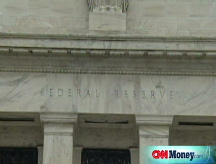Bond market's fear factor
Treasurys rise as uncertainty about the bailout continues. Auction of $34 billion in 2-year debt pressures short-term bonds.
NEW YORK (CNNMoney.com) -- Treasury prices were up Wednesday as doubts about the government's $700 billion bailout of the financial industry dragged on.
When the government's plan to buy up banks' troubled debt was first announced, stocks rallied and bonds plummeted, as investors came out of their bunkers and demonstrated some renewed confidence in the marketplace.
But it became clear at the beginning of this week that the enactment process would take a lot longer than the fast action the Bush administration sought. As new Democratic proposals have shifted the terms of the debate and some conservative Republicans have raised concern about the potential cost, the battle over the bailout appeared to have only started.
"Just last Thursday it looked like this thing could be passed by the end of this week," said Peter Cardillo, chief market economist with Avalon Partners. "With opposition on both sides, obviously, that's not the case anymore."
Furthermore, the government's bailout tab is adding up to more than $1 trillion, after billions of dollars also went to collapsing insurance company American International Group (AIG, Fortune 500), mortgage finance giants Fannie Mae and Freddie Mac, and investment bank Bear Stearns. That high price tag will weigh heavily on the dollar, sending inflation soaring and long-term debt investors worrying that their Treasurys will be almost worthless when they mature.
"The government printing presses will be working on full gear to pay for all of this," said Cardillo. "The implications of the rescue package has inflationary implications down the pike."
Long-term debt rose Wednesday as investor confusion about the bailout bill and nervousness about the future of the markets persisted.
"It's all about the fear factor," said Cardillo. "While equity markets are still having a bumpy ride, anxiety over the outcome of the bailout package will continue."
The benchmark 10-year Treasury note rose 2/32 to 101 20/32, and its yield was at 3.80, unchanged late Tuesday. Treasury prices and yields move in opposite directions.
The 30-year Treasury bond rose 1/32 to 102 4/32, and its yield held steady at 4.38% late Tuesday.
To finance the bailouts, the Treasury sold $34 billion in 2-year notes Wednesday - the largest Treasury auction in history. That will be followed by $24 billion auctioned in 5-year notes Thursday. That huge influx of government debt could reduce demand for an already squeezed market.
"Flight to quality is beginning to diminish somewhat for the moment as a lot more supply is coming to the market," Cardillo added. "Of course, that could change on a dime."
Another analyst, however, said that the support shown in Wednesday's auction is evidence that flight to quality is not dying. There were plenty of buyers, with more than $75 billion of bids offered for the $34 billion available in 2-year notes.
"As long as the market is shying away from risk, there will be enough money to support the risk-free assets like bonds," said Michael Cheah, bond fund manager at AIG SunAmerica.
After the auction, the 2-year Treasury note fell some, but later rose 2/32 to 100 22/32 and yielded 2.04%, down from 2.08% percent late Tuesday. The median yield on the auctioned bonds was 2.05%.
The yield on the 3-month Treasury bill was at 0.52%, down from 0.79% late Tuesday. Just a month ago, the yield on the 3-month bill was 1.69%.
The credit market endured one of its most tumultuous periods last week, with huge swings in both directions as investors were on high alert after the collapse of Lehman Brothers and AIG's bailout.
As a result, yields fell to historic lows during that time frame. The yield on the 10-year benchmark Treasury hit a five-year low of 3.25% Tuesday, and the 3-month yield fell all the way to 0%, as investors sought safe havens for their cash. ![]()



